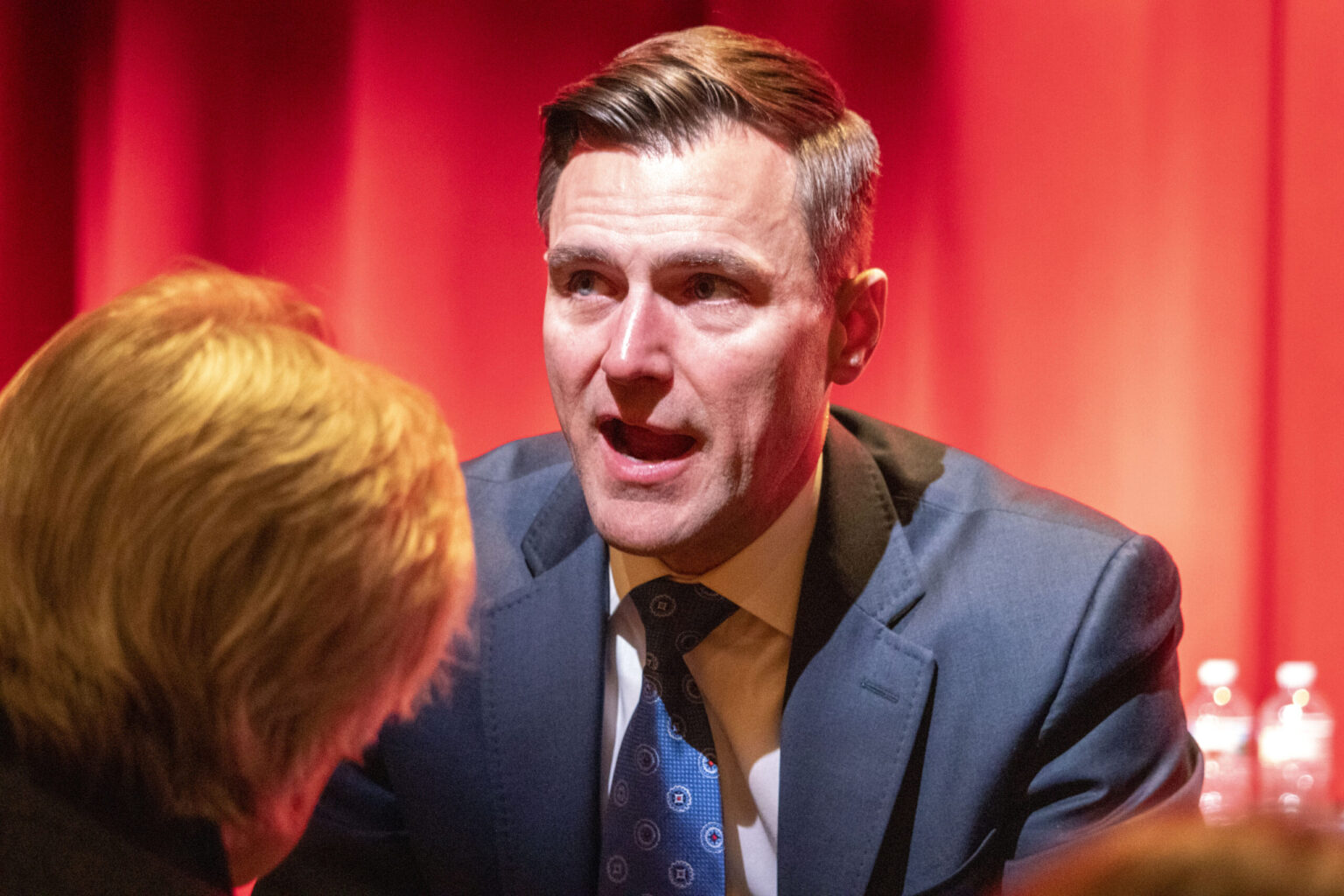Capital Chatter: Thoughts on the protests
Published 12:00 am Thursday, June 4, 2020

- Capital Chatter: The real reason that HB 2020 failed
In Oregon and across America, thousands of people engaged in peaceful protests, calling for racial justice and police reforms following the death of George Floyd while being arrested by Minneapolis police.
Still, violence ensued. People were injured and property destroyed in Portland and elsewhere. That is wrong. In Oregon’s capital, the city imposed a curfew for the first time and Salem Police deployed tear gas to control crowds.
Trending
This week I’ve been thinking about how our nation was founded with the right to peaceful protest, although paradoxically one of the defining acts leading up to the American Revolution was property destruction — the Boston Tea Party, which in turn was followed by more tea-dumping demonstrations. Like today, the Boston Tea Party involved many teenagers and young men. Like today, the issues in 18th century America were complicated and the feelings contradictory. Such American heroes as Samuel Adams and John Hancock were behind the Boston Tea Party, but others such as George Washington and Benjamin Franklin privately or publicly condemned the actions.
The issues being raised today are not new.
State Sen. Lew Frederick, D-Portland, who as a youth marched with the Rev. Dr. Martin Luther King Jr ., noted during a press conference Monday that some things have changed.
“But we’re here because some fundamental things have not changed,” said Frederick, who is African American. “I still wonder whether I’m going to die when I see a police car behind me.”
Meanwhile, the combination of protest property damage and pandemic economics have collided. To some Oregonians, we live in a state where a hairdresser or restaurant owner gets heavily fined, or threatened with arrest, just for trying to make a living, yet the governor deploys a fourth of Oregon’s state troopers and 50 National Guardsmen to Portland to protect the right of protesters to loot, burn and destroy the downtown area.
It is worth nothing that residents in small towns across Oregon have engaged in peaceful protests.
Trending
In McMinnville, high school students organizing a demonstration worked with the police department and kept the McMinnville Chamber of Commerce in the loop. In a letter to the chamber, which was distributed to local businesses, student Kacey Lee wrote: “This peaceful protest is meant to show solidarity to the nationwide Black Lives Matter Movement, bring awareness to systemic racism and police brutality, and inspire the McMinnville community to be more educated about racism in America.
“Although what happened to George Floyd may feel like a million miles away, it is imperative for small towns (including McMinnville) to realize that we are not immune to racism, and therefore cannot turn a blind eye to what is happening all over the nation. Further, being a predominantly white town it is crucial for our community to learn that not being racist is simply not enough. Rather, we must all push for change to become actively anti-racist — both systemically and individually.”
Lee added that to guard against transmission of COVID-19, protesters were being asked to wear masks, organizers were providing free masks and the protest area was being marked with six-foot indicators to maintain social distancing.
What happens now: On Thursday, Gov. Kate Brown ordered that state of Oregon flags at Oregon institutions be lowered to half-staff for the rest of the day to honor Floyd, who died May 25. His memorial service was Thursday in Minnesota.
Brown’s statement said: “As we mourn the loss of George Floyd, let us remember the many Black lives that have been taken by unnecessary violence. And let us commit ourselves, and our country, to fundamental change.”
At a press conference Wednesday, Brown said she was pleased to see three police accountability proposals from the Oregon Legislative People of Color Caucus. Its members are Democrats Rep. Teresa Alonso Leon, Woodburn; Rep. Janelle Bynum, Happy Valley; Rep. Diego Hernandez, Portland; Rep. Akasha Lawrence Spence, Portland; Rep. Mark Meek, Oregon City; Rep. Andrea Salinas, Lake Oswego; Rep. T awna Sanchez, Portland; Sen. James Manning, Eugene; and Sen. Frederick.
Two of the proposals involve legislation for consideration at a special legislation session.
During her opening remarks at the press conference, Brown said, “I look forward to working with legislators to get these proposals on my desk so I can sign them as soon as possible.”
However, Brown still has not said when she would call a special session, which has been talked about since March. I followed up Wednesday by asking her staff about the timing but have not heard back.
Brown also did not give a definitive answer, in response to reporters’ questions, as to whether authorities should have been enforcing crowd-size restrictions during the demonstrations so as to comply with her executive orders.
Graduation speech: Brown’s staff announced that she would deliver a virtual commencement speech to celebrate the class of 2020. Oregon Public Broadcasting will air the speech June 14 on radio and television.
Progress at Employment Department: In other news around the capital, the interim director of the Oregon Employment Department, David Gerstenfeld, on Wednesday held his first media briefing, a marked change from ousted director Kay Erickson. He apologized for delays in processing unemployment claims, promised greater transparency and unveiled an online dashboard for tracking overall progress.
However, the agency still doesn’t know how many people are waiting to be paid.
I asked when the department was notified of the COVID-19 executive orders that Brown would be issuing in mid-March, which restricted economic activity, and what steps the agency immediately took to ramp up its response. Gerstenfeld said he didn’t know because he was working in a different part of the agency at the time.
Brown secured Erickson’s resignation last weekend after Sen. Ron Wyden and others publicly called for Erickson to step down. It is highly unusual for Oregon’s federal lawmakers to get involved in a governor’s personnel decisions, which raises the question of whether Wyden forced Brown to act or whether he provided the political cover that Brown needed for her decision.
As far as legislative reaction to Gerstenfeld’s appointment, Sen. Michael Dembrow, D-Portland, wrote in his constituent newsletter: “David is someone I’ve worked with productively for many years on a variety of employment issues, including paid sick leave, family leave, and unemployment benefits. He has always been very clear, honest, and responsive, so I’m hopeful.”
By the way, state Rep. Marty Wilde, D-Eugene, said his chief of staff will work for the Employment Department for part of each day until everyone’s employment claims are processed.
The average telephone wait time on Wednesday was 36 minutes, a huge improvement.
Rural internet: The urban-rural divide was exemplified during the fourth video town hall recently conducted by Republicans Sen. Lynn Findley, Vale; Rep. Daniel Bonham, The Dalles; and Rep. Mark Owens, Crane. Owens’ internet connection kept crashing.
When Owens eventually was able to connect by phone, he explained it is irrigation season in Harney County, when a lot of brownouts occur.
By the way, broadband capacity is among 18 items on the Legislative Emergency Board’s agenda for Friday afternoon. House Speaker Tina Kotek, D-Portland, will chair the videoconference meeting.
Dick Hughes, who writes the weekly Capital Chatter column, has been covering the Oregon political scene since 1976. Contact him at TheHughesisms@Gmail.com , Facebook.com/Hughesisms, YouTube.com/DickHughes or Twitter.com/DickHughes.





